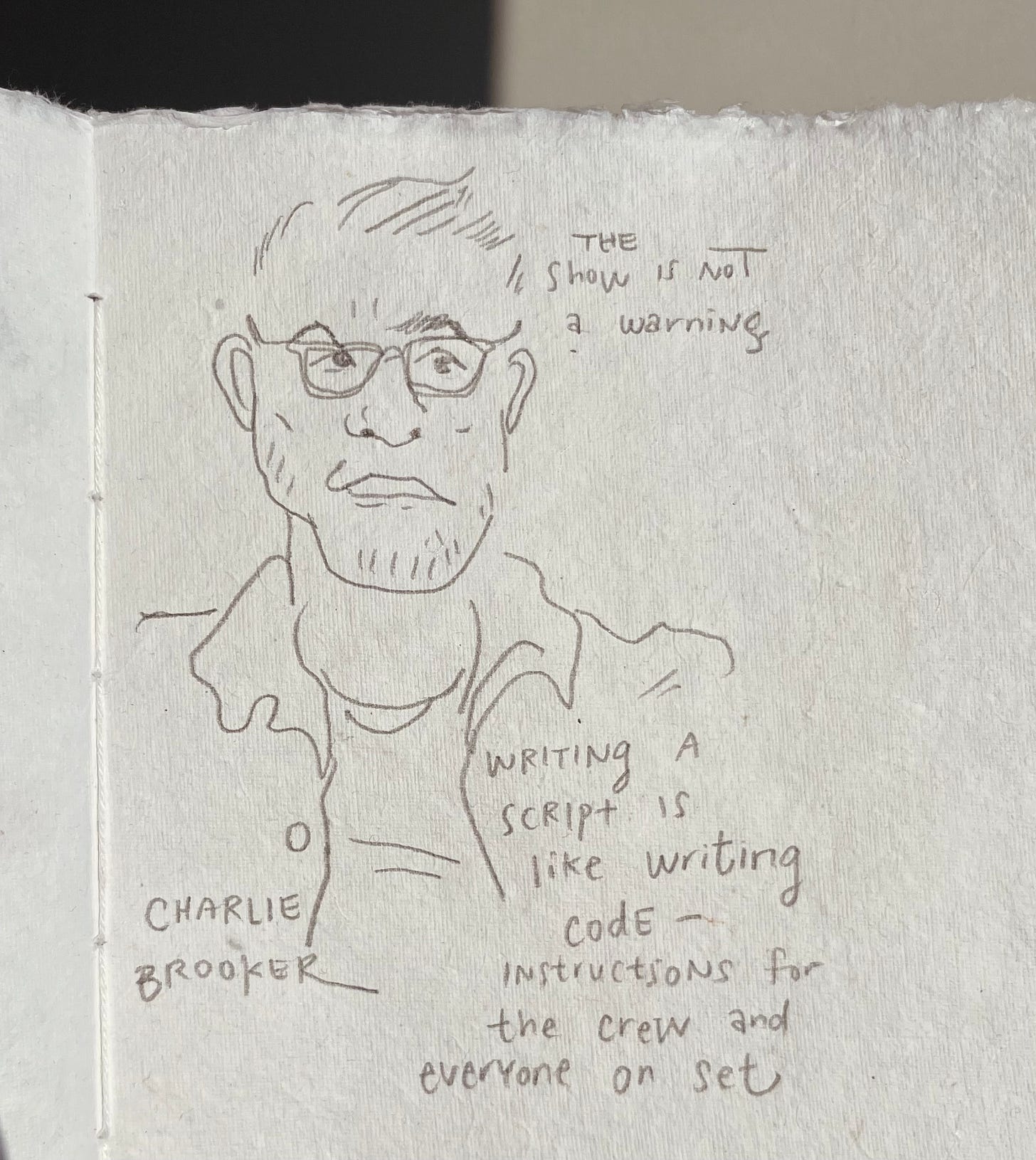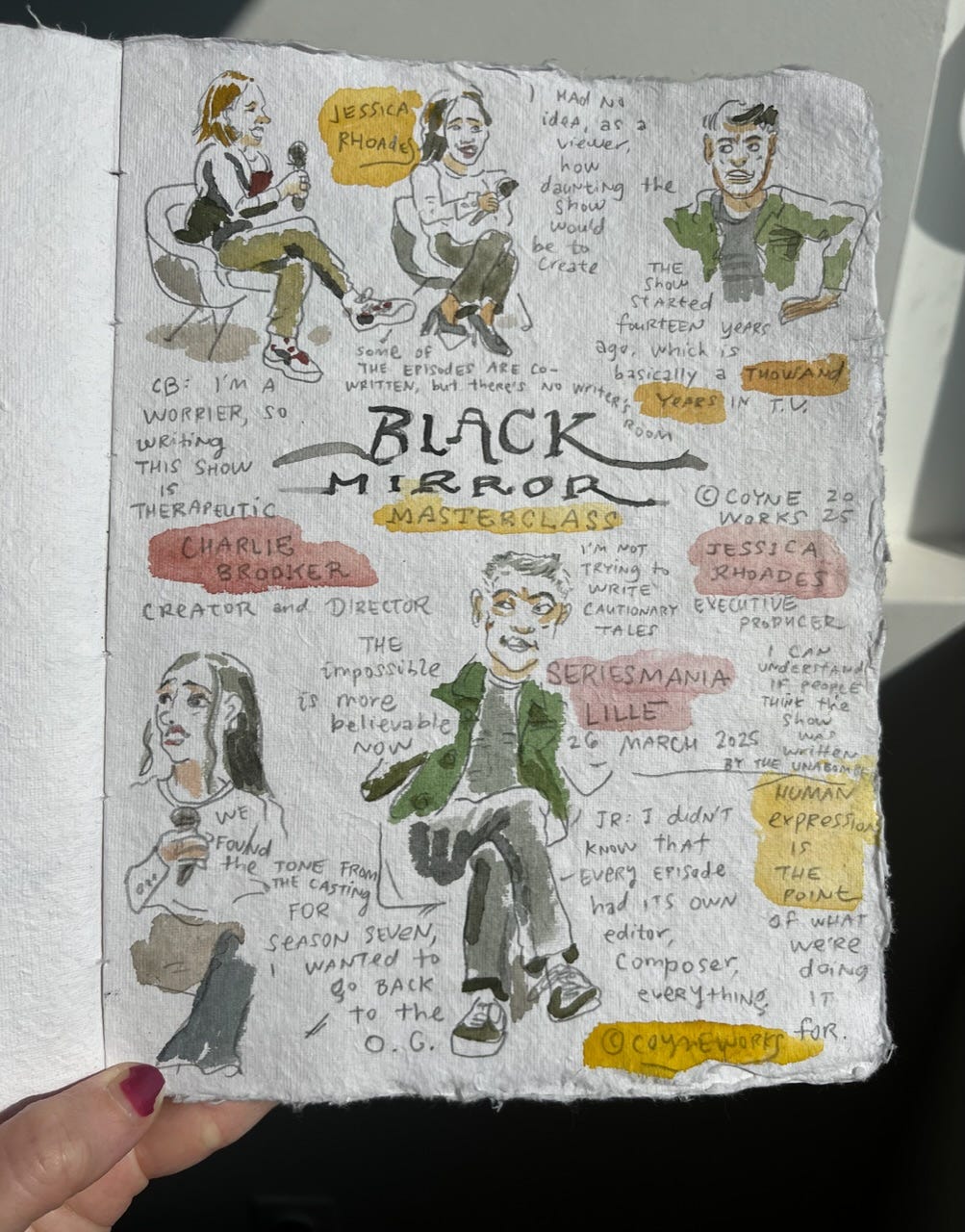Live Drawings of “Black Mirror” Creator Charlie Brooker, and What Makes the Show “Cathartic” for Him
Brooker’s notes on his creative process and his approach for Season/Series 7. It turns out he’s delightful??
Dear reader: thank you for being here!
I made a satirical* video last week about this newsletter’s new rise in the Substack ranks: Number 65 “Rising” in the category “International”.
*Dear L*rd I hope people know it was satirical
After I shared the video, the newsletter rose to Number 50, but it has since dropped in the rankings again, so if you end up enjoying this, please tell ALL of your friends! And have everyone you have ever met subscribe.
Black Mirror
In honor of Black Mirror’s seventh season, which debuts on Thursday, April 10th, here are my drawings of Black Mirror creator and writer Charlie Brooker from his visit to Series Mania, a TV festival here in Lille, France.
I’ll also include his commentary, below, on the genesis of the show, what defines it still, and what he kept in mind when crafting Season Seven.
For newcomers to the show, Black Mirror is an English TV show originally broadcast on the BBC and now streaming worldwide on Netflix. It tends toward “psychological thriller,” and usually features imagined technologies which could in theory be only a few years away. Brooker imagines how these technologies would affect our lives in totally unforeseen (and, to an episode, creatively devastating) ways.
I vividly remember discovering the show, watching the episode “The Entire History of You*” over a decade ago in a state of alternating grief and rapture. I had a wedding to go to that day, and I found it strangely difficult to peel myself away and leave. The show is about tech, but its beating heart is human folly, human feeling.
When I saw that Charlie Brooker would be one of the headliners of Series Mania, I jumped out of my gourd. (Is that the phrase? What does one do with one’s gourd when one is excited? I have many questions right now, and almost all of them are gourd-related).
The morning after his talk, I made a vocal note of what he had shared with us audience members. You can listen to it here here. Maybe best to listen at 1.25x speed since I speak slowly:
I made sure that I’d be drawing Brooker’s talk while I did live drawings of Series Mania Q and As. But the funny thing was, it wasn’t because I thought Charlie Brooker was gonna be my kind of guy.
Let me explain.
There’s a certain kind of smart, creative person. Many of them live in Hackney in London, Los Feliz in Los Angeles, and ::shiver:: Bushwick in New York City.
Black Mirror, since its inception with the infamous episode “The National Anthem” is reliably — almost insistently — sleek, stylized, clever, and totally self-assured. (Brooker noted that he can’t believe that particular episode was aired, and on the BBC no less).
So I thought Brooker himself would be sleek, stylized, and self-assured.
I thought he’d slink in, smirking and wearing a slate-toned merino turtleneck, some kind of statement glasses, and maybe weird architectural Hammer pants from Comme des Garçons over Converse sneakers**. I thought he’d be like a TV-industry Steve Jobs. I also thought he’d deftly insult the intelligence of us “underlings” with crushing comments we’d only be able to make sense of five hours later when we were back home.
I don’t know!
The Charlie Brooker who bounded onstage had nothing to do with any of these assumptions. He was all humility and thanks-for-having-me, launching into self-deprecating jokes and funny asides from the first second onstage.
My live drawings:
He said that he understands why people assume that Black Mirror is written “by the Unabomber,” given its coal-black social commentary.
But it’s not. It’s written by him. And he is a delight. Human AND humane. Inquisitive and restless and bursting with rapid humor. (It turns out that he’s a writer and co-creator on the Philomena Cunk series, too, which makes so much sense now, having experienced him and his love for the absurd!). And he was the picture of respectful — even reverent — attention, especially when getting questions from audience members.
The talk was moderate by media journalist Perrine Quennesson, who can be heard in the video above.
Brooker’s notes on the show are below, but first an aside:
Before the talk, I’d been downstairs in the theatre hall where there was a reception going on. (Like all film and TV festivals, every day offers a handful of industry events so attendees can pitch ideas, promise to “collaborate soon,” and secure funding).
At the event, there was a man who looked just like Dominic West (and could have, in fact, been Dominic West; we had stars milling about). He was square-jawed. Intent look. Razor-thin smirk. Blazer.
Given the man’s gravitas, I thought that this was Charlie Brooker having a tipple before his event. I came extremely close to telling faux-Brooker how brilliant he is, and only by the grace of God(dess) did I hold back and thus deliver myself from what would’ve been an excruciating moment. The Lord(ress??) truly works in mysterious ways! But She always delivers!
Sorry. I’m done now.
Back to Brooker’s talk.
My voice recording goes into more detail, but here’s a primer.
Brooker said that this upcoming season is “a return to the OG show” after he was criticized about the most recent season for venturing off into other directions, including the supernatural. (I’d held the same criticisms, and was horrified that the last season included a werewolf!). So we’re back to tech.
He said that, contrary to popular assumption, he does no research when developing script ideas. He doesn’t read tech industry magazines. He just thinks of a technology, and then thinks: “In what possible way could this go horribly, horribly wrong?”
He thinks that the moment where the character finds their situation irredeemably “f***ed” is the moment when it becomes a hallmark Black Mirror episode. It also happens to be the moment that he personally finds most hilarious.
But he said that the characters’ moments of catharsis, too, define the show. Those moments of (hopeless) freedom most characters undergo after all other avenues are lost.
He said that he is an inveterate worrier about the state of the world, and that writing the show gives him his own sense of catharsis.
Executive Producer Jessica Rhoades joked that she’s a major worrier but that Brooker worries “in the smartest way.” As in: has the greatest gift for prescience.
A point that Brooker repeatedly expressed was that he does NOT fancy himself a) more enlightened than other people — “if anything, I’m MORE fallible,” he said, b) someone whose intent is to “educate” or direct other people. He emphasized a few times that the show is not meant to be didactic.
Also, when it comes to his writing methods, he and Rhoades said that he generally works alone, but sometimes teams up a co-writer for an episode.
For example, this season featured an episode that Rhoades first read as a play script and passed on to Brooker — saying “This feels very ‘Black Mirror’” — and he collaborated with that playwright to develop the idea into an episode.
Rhoades also said that he’s a fast writer. “He would approach me on a Monday with an idea for an episode, and I’d say, ‘Okay, you have one week to hand it in,’ and he’d go off and write it and have it in on time.”
The episodes that he named as standout episodes were: “San Junipero,” “The Entire History of You,” “Be Right Back,” “Shut Up and Dance,” and “National Anthem.”
In the audio, I talk about the background and circumstances (as he described them) for “Be Right Back” (which is about a woman’s newly deceased husband coming back as an AI-fed humanoid) and “Striking Vipers” (the video game one, his memories were of playing “Mortal Kombat” with his buddies — he also used to write video game reviews for the magazine PC Zone in the nineties).
I left the talk feeling much more buoyant than I’d felt going in. It was nice to see someone so overflowing with BOTH human feeling AND profound intellect.
So, thank you to Series Mania for approving my request for a badge, and thank you to Charlie Brooker, Jessica Rhoades, and Perrine Quennesone for regaling us with fun anecdotes for an hour and a half!
*Apparently, “The Entire History of You” was in fact written by Jesse Armstrong, who co-created and co-wrote “Peep Show” and “Succession.”
**I think he did wear something like Converse sneakers, though.
If you liked anything about this, please share it, press the little heart, leave a comment, or do all three!
If you’d like a print of my drawing, get in touch.
For more illustrated newsletters from me about all things media and often non-media, subscribe below!











